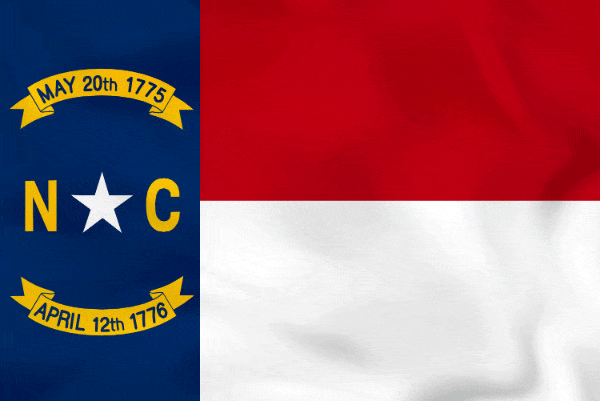North Carolina
State abbreviation/Postal code: N.C./NC Governor: Roy Cooper, D (to Jan. 2021)) Lieut. Governor: Dan Forest, R (to Jan. 2021) Senators: Richard Burr, R (to Jan. 2023); Thom Tillis, R (to Jan. 2021) Historical biographies of Congressional members
Entered Union (rank): Nov. 21, 1789 (12) Present constitution adopted: 1971 Motto: Esse quam videri (To be rather than to seem)
Nickname: Tar Heel State Origin of name: In honor of Charles I of England 10 largest cities (2012 est.): Charlotte, 775,202; Raleigh, 423,179; Greensboro, 277,080; Durham , 239,358; Winston-Salem , 234,349; Fayetteville, 202,103; Cary, 145,693; Wilmington, 109,922; High Point, 106,586; Greenville, 87,242 Land area: 53,819 sq mi (139,390 km2) Geographic center: In Chatham Co., 10 mi. NW of Sanford Number of counties: 100 Largest county by population and area: Mecklenburg, 919,628 (2010); Robeson, 949 sq mi. State parks: 29 Residents: North Carolinian 2017 resident population est.: 10,247,632 2010 resident census population (rank): 9,535,483 (10). Male: 4,645,492 (48.70%); Female: 4,889,991 (51.3%). White: 6,528,950 (68.5%); Black: 2,048,628 (21.5%); American Indian: 122,110 (1.3%); Asian: 208,962 (2.2%); Other race: 414,030 (4.3%); Two or more races: 206,199 (2.2%); Hispanic/Latino: 800,120 (8.4%). 2010 percent population 18 and over: 76.1; 65 and over: 12.9; median age: 37.4. |
English colonists, sent by Sir Walter Raleigh, unsuccessfully attempted to settle Roanoke Island in 1585 and 1587. Virginia Dare, born there in 1587, was the first child of English parentage born in America.
In 1653 the first permanent settlements were established by English colonists from Virginia near the Roanoke and Chowan rivers. The region was established as an English proprietary colony in 1663–1665 and in its early history was the scene of Culpepper's Rebellion (1677), the Quaker-led Cary Rebellion (1708), the Tuscarora Indian War (1711–1713), and many pirate raids.
During the American Revolution, there was relatively little fighting within the state, but many North Carolinians saw action elsewhere. Despite considerable pro-Union, antislavery sentiment, North Carolina joined the Confederacy during the Civil War.
North Carolina's economy is experiencing a shift away from tobacco, furniture and textiles to knowledge-based enterprises such as biotechnology, pharmaceuticals, and life sciences. The state was ranked third best state for business in 2010 by Forbes magazine. The major agricultural products are tobacco, corn, cotton, hay, peanuts, and vegetable crops. The state is the country's leading producer of mica and lithium.
Tourism is also important, with visitors spending more than $1 billion annually. Sports include year-round golfing, skiing at mountain resorts, both fresh- and salt-water fishing, and hunting.
Among the major attractions are the Great Smoky Mountains, the Blue Ridge National Parkway, the Cape Hatteras and Cape Lookout National Seashores, the Wright Brothers National Memorial at Kitty Hawk, Guilford Courthouse and Moores Creek National Military Parks, Carl Sandburg's home near Hendersonville, and the Old Salem Restoration in Winston-Salem.
See more on North Carolina:
Encyclopedia: North Carolina
Encyclopedia: Geography
Encyclopedia: Economy
Encyclopedia: Government
Encyclopedia: History
Monthly Temperature Extremes
All U.S. States: Geography & Climate
Printable Outline Maps
Record Highest Temperatures
Record Lowest Temperatures
Highest, Lowest, and Mean Elevations
Land and Water Area
All U.S. States: Population & Economy
Historical Population Statistics, 1790–Present
Per Capita Personal Income
Minimum Wage Rates
State Taxes
Federal Government Expenditure
Percent of People in Poverty
Births and Birth Rates
Homeownership
Percentage of Uninsured by State
All U.S. States: Society & Culture:
Most Livable States
Healthiest States
Most Dangerous States
Smartest States
Crime Index
Residency Requirements for Voting
Compulsory School Attendance Laws
Driving Laws
National Public Radio Stations
Selected famous natives and residents:
- David Brinkley TV newscaster;
- Howard Cosell sportscaster;
- Virginia Dare first person born in America to English parents;
- Elizabeth Dole government official;
- James B. Duke industrialist;
- Donna Fargo singer;
- Roberta Flack singer;
- Ava Gardner actress;
- Richard Gatling inventor;
- Billy Graham evangelist;
- Kathryn Grayson singer and actress;
- Andy Griffith actor;
- Jesse Helms politician;
- O. Henry writer;
- Barbara Howar broadcaster and writer;
- Andrew Johnson president;
- Charles Kuralt TV journalist;
- Sugar Ray Leonard boxer;
- Dolley Madison first lady;
- Ronnie Milsap singer;
- Thelonious Monk pianist;
- Alfred Moore jurist;
- Edward R. Murrow commentator and government official;
- Walter Hines Page journalist and ambassador;
- Floyd Patterson boxer;
- Richard Petty auto racer;
- James K. Polk president;
- Soupy Sales comedian;
- Earl Scruggs bluegrass musician;
- Randy Travis musician;
- John Scott Trotter orchestra leader;
- Thomas Wolfe novelist.


